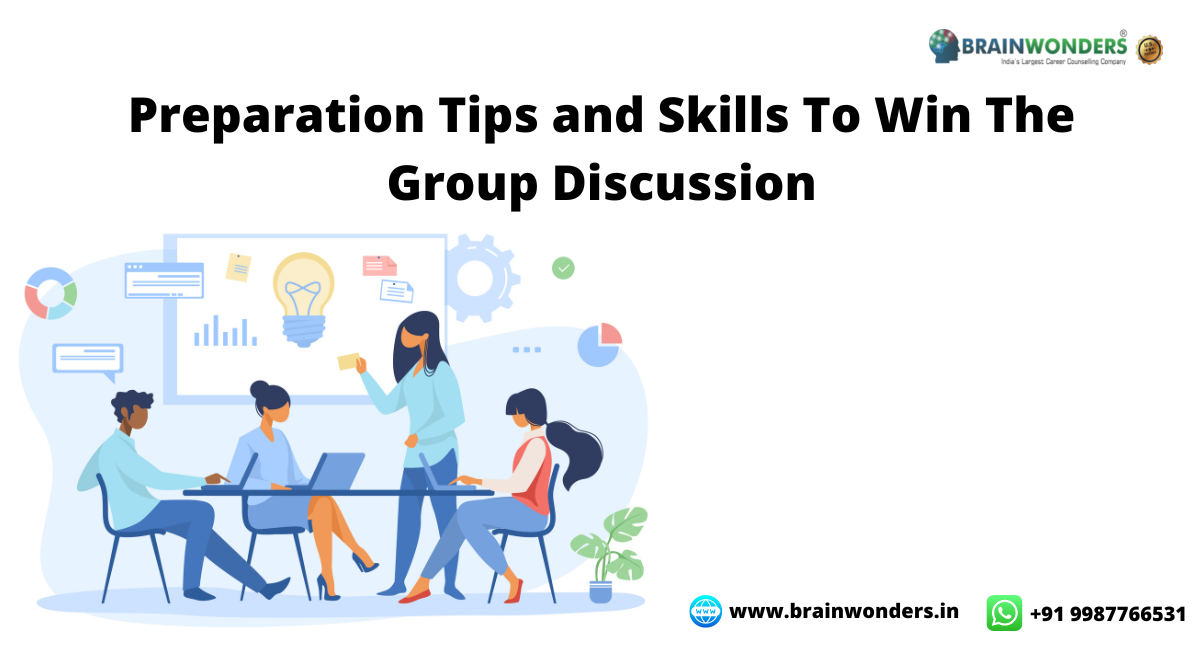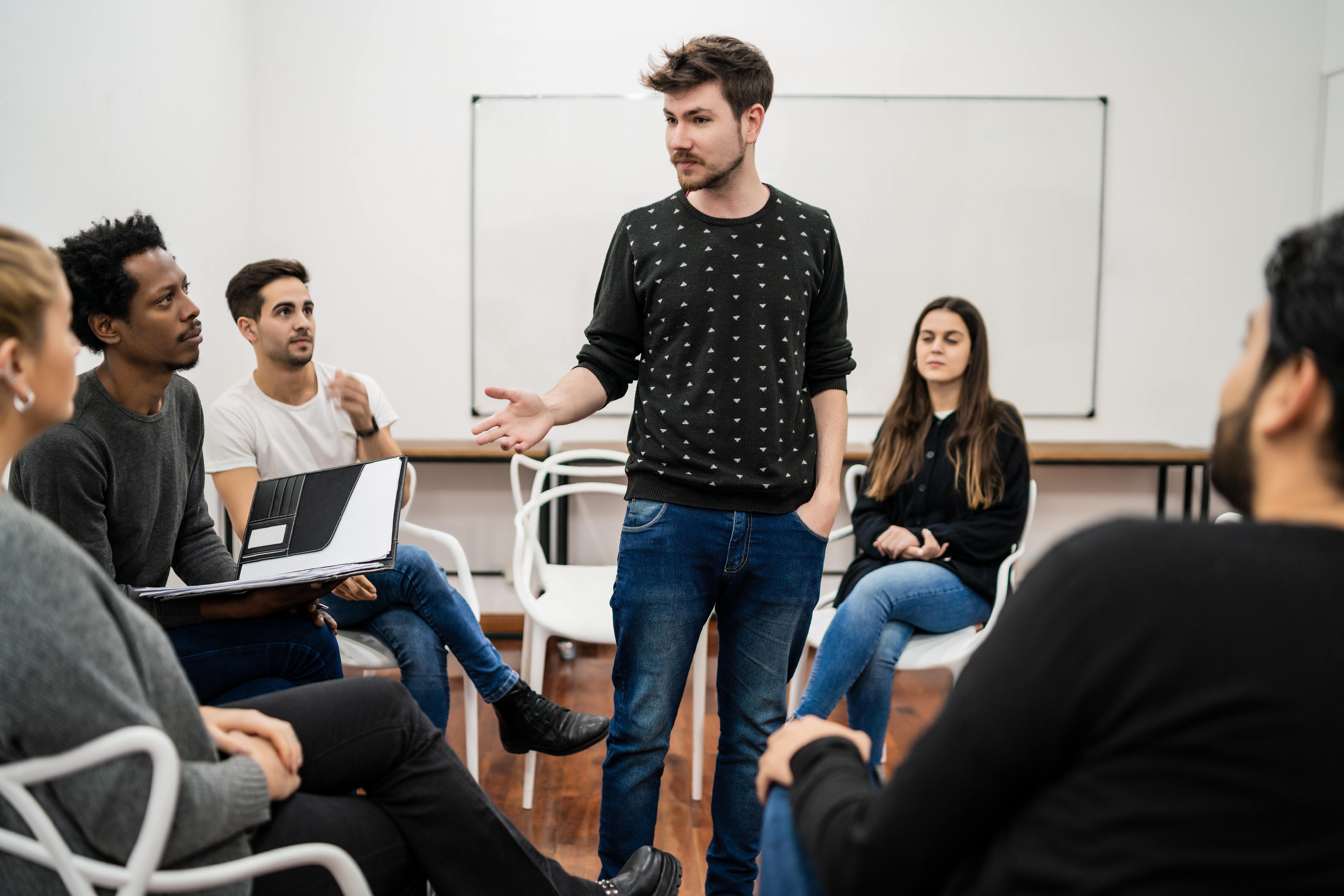

We have a database of over 11,000 colleges all over India.
Connect with us to find your perfect fit!
Blog
27 June,2022 | By Brainwonders

The Group Discussion, also called GD, is an important part of the interview process that candidates must take part in after they pass the written exam or aptitude test. A vital component in any screening process, group discussion involves the participation of a group of people who are asked to debate, interact and discuss various aspects of a topic given by the interviewers.
Whether you are looking to get into a great university or apply for a job, the group discussion round is something you are facing to get one step closer to accomplishing your dream.
Although many candidates find themselves in the chaos of confusion during their group discussions at the thought of how they will present themselves in a group discussion, the group discussion round is not a difficult task. Still, it seems to be a challenging task, but once it is clear, your chances of getting selected increase.
In this blog, we have shared some preparation tips you need to incorporate and practice beforehand. Thus it will alternately set you up for success in group discussions. But before we get into that, let's help you know why the Group Discussion round is essential.
Interviewers can utilise the group discussion round to assess candidates on various factors, including their confidence level, collaborative traits, communication and leadership skills and analytical and logical abilities.
So, now that you know what group discussion is and why it is essential from an interviewer's viewpoint, check out the below-mentioned group discussion tips that will help you crack the Group Discussion round in the best possible way

The first thing that catches the eye of the individual is how well they dress up. The first impressions make an ever-lasting impact, so remember that wherever you go for group discussion, you must adequately groom yourself. So make sure you are professionally dressed.

Apart from your academic qualifications, you must also have general knowledge. Try to keep updated yourself with the latest and trending news or topics. Read newspapers, magazines, journals, and editorials regularly to help you in group discussions. You can also use news applications which provide the latest information.

Group discussion is about interacting with the other group discussion members formally. For interaction, you must practice yourself before going for a group discussion. Try to rehearse your speech, presentation and appearance in front of a mirror and speak to yourself. It will increase your confidence and make you confident enough to talk with the other group members and the panel members.

Maintain a relaxed and friendly attitude at all times. Avoid making unnecessary hand motions, pointing fingers, and other odd actions. It's bad manners to disagree by cleaning your nose, waving your arms, or moving your hands to emphasise your argument. In order to make your point more clearly understood, attempt to maintain eye contact with the person you are conversing with.
Be aware that everything you do, from entering the room, including how you sit, how you talk, how you react, and how you interact, all things will be monitored.

Whenever you are trying to speak, first understand the point of view of others. Also, it will help you to know which points to add and which topics are already said. As a result, listening skills play a vital role in group discussions because if you listen, you can only speak carefully.
If you agree with the points said by the other members of the group discussion, you can firmly say, "Yes, I Agree" Such actions will make you a better team member. This method is helpful because panellists can see how candidates work as a team, how they react to different points of view, and how polite they are in general.
What matters in the group discussion is how well you present your opinion and views and how convincing your arguments are to the interviewers and other group members. Speaking clearly to make a positive impression through your speech is essential. After delivering your initial view, one other thing to remember is that you shouldn't just sit back and relax. Contribute to the conversation whenever you believe it is relevant to do so, and use the agreeable phrases whenever you agree with the other member's statement.
The right time to start the conversation is prominent in the group discussion. Some individuals might believe that speaking first grabs the attention of the panel members, but that is not the same for everyone. You can initiate the discussion if you have the statistical or valuable information related to the topic. Still, speaking during the intervals in or between the conversations is preferable. If you are hesitant or confused about the subject of the discussion, you should listen to what other participants say and revert your response to what you've heard.
If you want to stay on track with what you are talking about, aim more on the content you will cover in your speech rather than how long it will be. If the conversation starts to go off track, you should attempt to steer it back on course as soon as possible. Making an effort to keep the discussion focused on the topic will highlight your ability to lead those conducting the interview.
It often happens that at some point, the group discussion members even enter into a negotiation. Still, sometimes you need to act calm and control your aggression if you disagree with the statement. It often happens when the other members disagree with our ideas; at that time, you also need to act calmly to create a good impact on the group discussion.
It is essential to maintain eye contact while speaking. While addressing a group, you should make eye contact with all the other members present in the group discussion. This will help the interviewer to monitor your confidence while speaking.
Do not hesitate while addressing your viewpoint; you need to speak clearly, well and aloud. This is the most significant of all the aspects; eventually, to impress recruiters, one must speak fluently. Therefore, one should improve their language skills.
At the end of a group discussion, end the conclusion by covering whole points that you and your members stated in the group members. Try to summarise, keep it simple, and provide the validated judgement for the best results.
The final advice for participating in group discussions is to make many contributions to your session. If you feel that you have an adequate response to the points raised by other participants, you are welcome to contribute to the conversation on many occasions. This will make your viewpoint more impactful.
The first thing an interviewer checks is how well you know the subject area of the job. For example, if you apply for a job in sales, the company will expect you to learn a lot about their products and how to sell them.
Some jobs need new ideas and solutions that don't come from the usual places. In these situations, the panellists may use group activities to see how creative and unique their opinions are as a group. For that, you have to think out of the box.
Communication skills include controlling your tone, volume, pitch, and how you say things. This is a skill you need to work with customers or talk to your peers and seniors often. In a typical group discussion, employers look for a confident attitude, an authoritative voice, clear speech, and a tone that can be heard.
Your body language at work says a lot about how you act and feel. So, during a group discussion, panellists look at how you move your hands and head and how you look on your face. They also give high marks for a confident, straight posture and a professional look.
For jobs in sales or customer service, it's essential to be able to speak politely and fluently. When you use pauses well and don't stutter, you can keep people's attention and make them listen carefully. Because of this, many employers check your speech and this skill simultaneously.
Taking the lead is a sign that a person is a good leader. At first, panellists watch to see if you try to start the conversation and set the tone for how it will go. If you can't do that, they check to see if you wait for the right time and use that chance to explain your idea better. Using statistics and well-known quotes to back up your speech also leaves a good impression on your listeners and interviewers.
Most of the time, the panellists look to see if you start with your point of view or if you ask others what they think. Helping other people understand the topic and considering their points of view shows that you are a good leader. Panellists will also give you extra points if you can use the ideas of others, change the flow of the conversation, and steer it toward decisions that can be put into action.
Active listening is a critical skill for people who want to be managers or work in customer service. In a typical group, everyone tries to make their point stand out so they can get some attention. So, employers tend to look for people who listen to their coworkers without talking over them. Letting them talk, responding to what they say, and mentioning their points of view at the end of the conversation shows that you are a good listener.
Are you unsure or unaware of your personality? Want to know the plus and minus points of your personality? If yes, then you can go for Personality Tests. We at Brainwonders provide various psychometric tests. Personality tests are beneficial in order to help you identify your personality strengths and weaknesses. It will help you to map down your strengths and weaknesses so that you can work towards improving your weaknesses and convert those weak areas into strengths.
You can even take the Brainwonders DMIT Tests, which is a biometric test that will give you a clear idea about your innate abilities, strengths, interest areas, and potential as an individual. We have already assisted thousands of students in determining their area of interest and determining the best career option for them; we are ready to assist you as well!
Fill the form to know how!